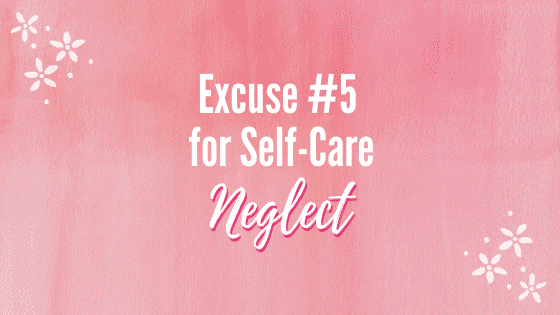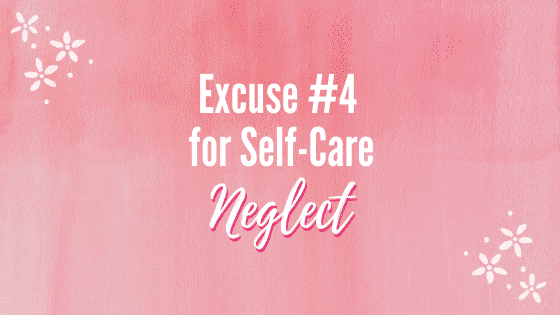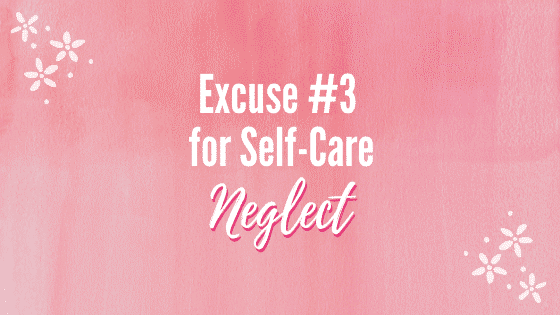5 Excuses For Lack of Self-Care
Be wary of what keeps you from putting yourself first!
Your level of self-care is apparent in the way you carry yourself. From my experience, when you stop treating yourself, making time for yourself, or even liking yourself, you’ve fallen into a trap of self-neglect. But all is not lost! Once you identify the thought patterns that stymie self-care, you’re equipped to make a change that puts the focus back on you!
Here are the top five excuses (or as some say “reasons”) for lack of healthy self-care:
Excuse #1: People Will Stop Liking You
You believe that people will stop liking you if you started taking care of yourself and putting yourself first. You believe that choosing yourself first will pit people against you … maybe because you did something they couldn’t do. Or maybe they don’t like the fact that you are standing up for yourself.
And you know what? You are right!
Some people will stop liking you. Some people will not want to be around you.
Why?
Because they like you the way you are when you aren’t liking yourself 😕
And why’s that?
Because they often get what they want from you when you’re not standing up for yourself.
And here’s what I say about that: “Some will, some won’t. So what?! Next!”
You might think to yourself, “What will people think if I said no?”
NO to the fundraiser…
NO to the event…
NO to the party…
NO to letting someone move in with you…
NO to helping babysit…
You might be afraid that people will dislike you or that you might lose friends over choosing yourself. But what needs to be looked at is the reality; the reality is that people judge, they’ve always judged, and they will continue to judge. What you need to consider is if you want to work to keep those types of people in your life. When you work hard and sacrifice yourself to make others happy, you need to be acutely aware of the load it puts on you.
The sacrifice required of you to keep other people happy is not worth it. Often times, people really struggle to adjust when you start putting yourself first. That doesn’t mean they can’t, don’t, or won’t understand but rather, they just have a hard time seeing that you are in control. When they aren’t in control of you anymore, it’ll be uncomfortable. When you learn something new, it’s going to be uncomfortable. You can count on it.
Excuse #2: You’re Validated By What You Do For Others
You have a sense of pride in being a caretaker or caregiver. You wear it like a badge of honor because you are proud of the fact that you do so much for others … and that’s how you get your value — “I am always there for everyone when they need me.”
Even when you are tired, even when you are sick, even when you have no energy left, you derive a sense of value or purpose when you feel others need you. Without that, you don’t know who you are, what you’d do, or how you’d feel.
When you put yourself first, you start to lose the identity of the caretaker, caregiver, or what some might even call a martyr. Yes, I know a martyr and a caregiver are two different roles but when you believe that you have an obligation to do things for everybody else or nobody will survive, it becomes very similar.
Excuse #3: FOMO – (Fear Of Missing Out)
You feel like you’ll miss out. You try to keep up with everyone and everything because you’re afraid that if you don’t keep up you might miss out on all the opportunities, all the fun, and all the possible connections with other people.
So often our default setting is YES! YES! YES!
We want to fit in with everybody else but don’t realize that FOMO results in us living for everybody else’s life instead of living our own.
This only leads to further conflict because we’re in a place of wanting to put ourselves first but the crippling fear of missing out on opportunities and disappointing people prevents us from doling out a simple “You know what, I think I’m just going to be low-key and stay in.”
You might think that if you don’t do every single thing your friends want, you might miss that one chance to meet your true love. Or that if you don’t do everything your church asks, you may not be asked you to contribute anymore because they’d no longer see you as someone who is responsible. Or that if you don’t do all of the extracurricular activities in your community, you’d miss out on integral connections with other people.
Lot of us suffer from FOMO-induced anxiety! 😩
Excuse #4: You Don’t Feel Worthy
I think #4 is the main universal reason for lack of self-care.
You’ve been taught to put everybody else first for so long, in so many arenas. Whether family, society, workplace, church, or your education, every sense of structure has taught you to place yourself after others. You’ve done it for so long that you’ve learned to negate your own personal needs, your own desires, and when you do that long enough it becomes habitual.
What this habit breeds is a detrimental belief that everyone else’s value is higher than your own. You’ve been in it for so long that you don’t believe you have an equal value to others. As you start to tell yourself, “I don’t feel worthy”, it leads to corresponding self-destructive behavior. Resentment, depression, and anger become the norm, and that type of energy cycle grows stronger daily unless addressed intentionally.
Excuse #5: You Feel Responsible For Others
Because you were/are a caregiver you feel responsible for the needs of everyone around you.
Whether the needs of the other are physical, mental, emotional, or spiritual, it becomes second-nature for you to lay claim on them, with the intention of helping. Here’s the thing, you are not responsible for anyone… except if you have children under a particular age (16-18 years of age). Once your children are able to make their own choice and have a sense of right and wrong, they become responsible for their own lives. You may start to feel like they need you still, or feel like you failed them, or maybe even feel like you are stuck somewhere in the middle. When you feel that, you should consider these three questions:
- Is it possible that you care too much for people in your life and that in caring so much for them you hinder their growth and expansion?
- How would you feel if they were not able to develop their own skills and walk through life themselves?
- Do you actually have any control over their lives?
Answering these questions will help you assess if your caregiving responsibility is healthy or not.
Sooo … what now?
If you find yourself resonating with one or more of the above, here are some key takeaways to think about that could help your self-care:
- Take other peoples’ thoughts of you with a grain of salt. You’re the author of your own life; no one else is going to write your story, just you.
- Find validation in not just what you do for others but how you do them. Base your success on caring for others while still maintaining an equal level of care for yourself.
- See your opportunities as limitless. Step out of the mind frame of FOMO and into the mind frame of LIFE IS HAPPENING FOR ME.
- You define your worth, that’s a fact. How others view you is an opinion, another fact 😉
- Each person’s life is their own, even your children’s. Eventually they are going to have to live. So focus on teaching them how to take responsibility for themselves rather than you taking it for them.
I love you!
Would love to hear your thoughts about this important topic 😊
Sunny Dawn Johnston ❤️
Blog Categories
More Interesting Posts
How Can I Serve Humanity?

Excuse #5 for Lack of Self-Care

Excuse #4 for Lack of Self-Care
